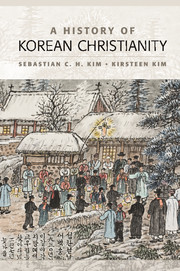Book contents
- Frontmatter
- Contents
- Illustrations
- Acknowledgements
- Abbreviations
- Maps
- Chapter 1 Introduction
- Chapter 2 Believers, Martyrs and Missionaries, 1592–1876
- Chapter 3 Evangelism, Patriotism and Revivalism, 1876–1910
- Chapter 4 Oppression, Resistance and Millennial Hope, 1910–1945
- Chapter 5 Liberation, Service and Divisions, 1945–1961
- Chapter 6 Growth, Thought and Struggle, 1961–1988
- Chapter 7 Missions, Reconciliation and Public Life, 1988–Present
- Glossary
- Bibliography
- Index
Chapter 5 - Liberation, Service and Divisions, 1945–1961
Published online by Cambridge University Press: 05 March 2015
- Frontmatter
- Contents
- Illustrations
- Acknowledgements
- Abbreviations
- Maps
- Chapter 1 Introduction
- Chapter 2 Believers, Martyrs and Missionaries, 1592–1876
- Chapter 3 Evangelism, Patriotism and Revivalism, 1876–1910
- Chapter 4 Oppression, Resistance and Millennial Hope, 1910–1945
- Chapter 5 Liberation, Service and Divisions, 1945–1961
- Chapter 6 Growth, Thought and Struggle, 1961–1988
- Chapter 7 Missions, Reconciliation and Public Life, 1988–Present
- Glossary
- Bibliography
- Index
Summary
Protestant and Catholic leaders in Korea welcomed their liberation from Japan on 15 August 1945 wholeheartedly and saw it as the opportunity they had been waiting for to shape a Christian future for the nation. Christian leaders urged that the Japanese be allowed to leave peacefully with no reprisals, while, ironically, popular wrath was directed at Korean collaborators instead (Foley 2003:25). The unexpected defeat of Japan was greeted more with relief than with ecstasy because, although the resistance armies had fought the Japanese occupiers for decades, Koreans were not the ultimate victors over them, and the circumstances of Korea’s freedom only served to underline the country’s dependence on foreign powers (Park Chung-shin 2003:158). The Japanese left behind a country with little national capital or technological capability and woefully unprepared – politically, economically, educationally, socially or culturally – for independence (Eckert et al. 1990:263; Kang Man-gil 2005:22, 98–100). Nevertheless, Koreans were ‘determined to construct a strong state as an answer to foreign domination, military weakness and economic “backwardness”’ (Armstrong 2007a:5). However, Korea was soon faced with even greater problems: another trusteeship leading to the division of the peninsula into two parts by occupying forces with a growing rivalry and the deepening of ideological divisions.
Liberation and Christian Leadership, 1945
In 1945 Christians were perhaps only 2–3 per cent of the population but they comprised a high proportion of educated Koreans and so they naturally presented themselves as leadership candidates as the retreating Japanese hastily looked to transfer power. The man who accepted the invitation was Yeo Un-hyeong, who had studied at Pyongyang Theological Seminary and worked as an assistant pastor. He called for unity and restraint from the people and set up the Committee for the Preparation of Korean Independence (CPKI), which brought together leading nationalists of different persuasions, including many Christian figures such as the intellectual Yi Dong-hwa, the 1919 signatory Kim Chang-jun and the well-known Methodist minister Yi Gyu-gap. Koreans mobilised themselves at the local level in ‘people’s committees’, of which most local chairpersons were Protestant ministers or lay Christian leaders (Armstrong 2004:119–20). On 6 September 1945, Yeo announced the formation of the Korean People’s Republic (KPR) and a schedule for elections. The new government announced moderate leftist reforms and denounced several hundred accused of collaboration as ‘national traitors’ (Eckert et al. 1990:331–32).
- Type
- Chapter
- Information
- A History of Korean Christianity , pp. 157 - 206Publisher: Cambridge University PressPrint publication year: 2014



